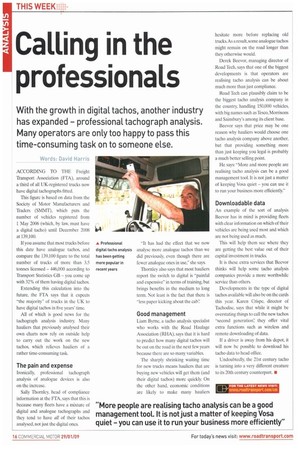Calling in the professionals
Page 16

If you've noticed an error in this article please click here to report it so we can fix it.
Words: David Harris
ACCORDING TO THE Freight Transport Association (FTA), around a third of all UK-registered trucks now have digital tachographs fitted.
This figure is based on data from the Society of Motor Manufacturers and Traders (SMMT), which puts the number of vehicles registered from I May 2006 (which, by law, must have a digital tacho) until December 2008 at 139,100.
If you assume that most trucks before this date have analogue tachos, and compare the 139,100 figure to the total number of trucks of more than 3.5 tonnes licensed — 446,000 according to Transport Statistics GB — you come up with 32% of them having digital tachos.
Extending this calculation into the future, the FTA says that it expects "the majority" of trucks in the UK to have digital tachos in five years' time.
All of which is good news for the tachograph analysis industry Many hauliers that previously analysed their own charts now rely on outside help to carry out the work on the new tachos, which relieves hauliers of a rather time-consuming task.
The pain and expense Ironically, professional tachograph analysis of analogue devices is also on the increase.
Sally Thornley, head of compliance information at the FTA, says that this is because many fleets have a mixture of digital and analogue tachographs and they tend to have all of their tachos analysed, not just the digital ones. "It has had the effect that we now analyse more analogue tachos than we did previously, even though there are fewer analogue ones in use," she says.
Thornley also says that most hauliers report the switch to digital is "painful and expensive" in terms of training, but brings benefits in the medium to long term. Not least is the fact that there is "less paper kicking about the cab': Good management Liam Byrne, a tacho analysis specialist who works with the Road Haulage Association (RHA), says that it is hard to predict how many digital tachos will be out on the road in the next few years because there are so many variables.
The sharply shrinking waiting time for new trucks means hauliers that are buying new vehicles will get them (and their digital tachos) more quickly. On the other hand, economic conditions are likely to make many hauliers hesitate more before replacing old trucks.As a result, some analogue tachos might remain on the road longer than they otherwise would.
Derek Beevor, managing director of Road Tech, says that one of the biggest developments is that operators are realising tacho analysis can be about much more than just compliance.
Road Tech can plausibly claim to be the biggest tacho analysis company in the country, handling 150,000 vehicles, with big names such as Tesco, Morrisons and Sainsbury's among its client base.
Beevor says that price may be one reason why hauliers would choose one tacho analysis company above another, but that providing something more than just keeping you legal is probably a much better selling point.
He says: "More and more people are realising tacho analysis can be a good management tool. It is not just a matter of keeping Vosa quiet — you can use it to run your business more efficiently."
DownWadable data An example of the sort of analysis Beevor has in mind is providing fleets with clear information on which of their vehicles are being used most and which are not being used as much.
This will help them see where they are getting the best value out of their capital investment in trucks.
It is these extra services that Beevor thinks will help some tacho analysis companies provide a more worthwhile service than others.
Developments in the type of digital tachos available will also be on the cards this year. Karen Crispe, director of Tachodisc, says that while it might be overstating things to call the new tachos "second generation': they offer vital extra functions such as wireless and remote downloading of data.
If a driver is away from his depot, it will now be possible to download his tacho data to head office.
Undoubtedly, the 21st century tacho is turning into a very different creature to its 20th century counterpart. •
























































































































































